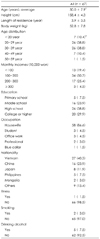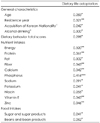Abstract
The purpose of this study was to investigate Korean food adaption, eating behavior and dietary intakes of married female immigrants by age, number of residence years in Korea and level of income. The survey included 67 female marriage immigrants attending the Korean language class at the multicultural family support center within the northern part of Kyonggi province from October 2010 to July 2011. General characteristics, Korean dietary life adaptation, and eating behavior were collected and dietary intakes were assessed using 24-hour recall. The home countries with regards to all subjects were Vietnam (40.3%), China (23.9%), Japan (11.9%), Philippines (7.0%), and Mongolia (3.0%). Total energy intake was 1432.5kcal and there were significant differences in nutritional intake concerning vitamin B1 and vitamin B2 by age (p < 0.05). More than 50% of subjects did not meet estimated average requirements for calcium (56.7%), zinc (52.2%), vitamin C (55.2%), and folic acid (76.1%). Food adaptation scores were significantly correlated with general characteristics (age, residence year, drinking alcohol and acquisition of nationality), total scores of eating behavior, and nutritional intake (energy, protein, fat, fiber, calcium, phosphorus, sodium, potassium, niacin, vitamin E, and zinc). These results might suggest that the better their Korean food adaptation, the more desirable their eating behavior and nutritional status.
Figures and Tables
References
1. Kwak DW. Research to ingestion of food and an attitude from food and drink of multicultural family [Master thesis]. 2009. Daejeon: Woosong University.
2. Kang IJ. A survey on nutrition knowledge and dietary life of women in multi-cultural families [Master thesis]. 2011. Gyeongsan: Yeungnam University.
3. Kim JE, Kim JM, Seo SH. Nutrition education for female immigrants in multicultural families using a multicultural approach: In-depth interviews with female immigrants and nutrition education professionals. Korean J Nutr. 2011. 44(4):312–325.

4. Statistics Korea. 2011. http://kostat.go.kr/.
5. Hyun KJ, Kim YS. Development of a Korean life adaptation measure for female marriage immigrants. Health Soc Welf Rev. 2011. 31(4):63–100.

6. Jin HS. Effect of nutrition education on food habit, dietary attitude, nutrition knowledge and nutrient intake of female married immigrants [Master thesis]. 2010. Jeonju: Chonbuk National University.
7. Ko HJ. A study on the dietary habits and nutritional knowledge of marriage-immigrant females in GwangJu and Chonnam Province [Master thesis]. 2010. Gwangju: Chonnam National University.
8. Lee YO. Status of diet life and nutritional education of immigrants women internationally married in the multicultural family which is the subject of Nutriplus Program in Jeonbuk province [Master thesis]. 2010. Gunsan: Kunsan National University.
9. Woo SY. A study about the dietary life conditions of Daegu international immigrant women [Master thesis]. 2010. Gyeongsan: Daegu Haany University.
10. Park YI. A study on multi-cultural family wives adapting to Korean cuisine and dietary patterns [Master thesis]. 2009. Seoul: Sookmyung Women's University.
11. Tucker KL. Dietary patterns, approaches, and multicultural perspective. Appl Physiol Nutr Metab. 2010. 35(2):211–218.
12. Kim SH, Kim WY, Lyu JE, Chung HW, Hwang JY. Dietary intakes and eating behaviors of Vietnamese female immigrants to Korea through marriage and Korean spouses and correlations of their diets. Korean J Community Nutr. 2009. 14(1):22–30.
13. He J, Klag MJ, Wu Z, Qian MC, Chen JY, Mo PS, He QO, Whelton PK. Effect of migration and related environmental changes on serum lipid levels in southwestern Chinese men. Am J Epidemiol. 1996. 144(9):839–848.

14. Huang B, Rodriguez BL, Burchfiel CM, Chyou PH, Curb JD, Yano K. Acculturation and prevalence of diabetes among Japanese-American men in Hawaii. Am J Epidemiol. 1996. 144(7):674–681.

15. Yang EJ, Chung HK, Kim WY, Bianchi L, Song WO. Chronic diseases and dietary changes in relation to Korean Americans' length of residence in the United States. J Am Diet Assoc. 2007. 107(6):942–950.

16. Kim J, Sim YJ. Relationship of acculturation to demographics and dietary habits among Korean Americans. Korean J Community Nutr. 2001. 6(2):243–249.
17. Han YH, Shin WS, Kim JN. Influential factor on Korean dietary life and eating behaviour of female marriage migrants. Comp Korean Stud. 2011. 19(1):115–159.
18. Jeong MJ, Jung EK, Kim AJ, Joo N. Nutrition knowledge and need for a dietary education program among marriage immigrant women in Gyeongbuk region. J Korean Diet Assoc. 2012. 18(1):30–42.

19. Lee SE. Association between stress, and nutritional and health status of female immigrants to Korea in multi-cultural families [Master thesis]. 2009. Seoul: Ewha Womans University.
20. Lyu JE, Yang YJ, Lee SE, Chung HW, Kim MK, Kim WY. Nutritional status of Vietnamese female marriage immigrants to Korea in relation to length of residence in Korea. Ann Nutr Metab. 2009. 55(4):317–324.

21. Jang BS. A study on dietary life of immigrant women [Master thesis]. 2009. Seoul: Kyung Hee University.
22. Kim JM, Lee NH. Analysis of the dietary life of immigrant women from multicultural families in the Daegu area. J Korean Diet Assoc. 2009. 15(4):405–418.
23. Cho YA. A study on evaluation of food behavior and nutritional risks of Vietnamese female immigrants in Korea [Master thesis]. 2010. Seoul: Kyung Hee University.
24. Oh KS. Marital conflict in relation with dietary adaptation and acculturation stress among married immigrant women [Master thesis]. 2010. Jeonju: Chonbuk National University.
25. Park SY. Acculturation and eating practices of Korean American families living in California-focused on families with adolescents- [Master thesis]. 2002. Seoul: Seoul National University.
26. Lv N, Cason KL. Dietary pattern change and acculturation of Chinese Americans in Pennsylvania. J Am Diet Assoc. 2004. 104(5):771–778.

27. Nam IS, Ahn S. Comparison of stress, social support, and martial satisfaction between married immigrant women in unban rural areas. Korean J Women Health Nurs. 2011. 17(2):99–108.

28. Lee JS. The variables affecting acculturative stress of women in international marriages. Korean J Hum Ecol. 2010. 19(6):919–932.

29. Yang SJ, Kim JA, Kim SN, Choi HY, Park CS, Dan HJ. Health concept, health status and health service utilization of marital immigrant women in urban and rural areas in Korea. 2009. Seoul: Ewha Womans University Management Center for Health Promotion.
30. Lien DTK, Thanh HK, Giay Y. Nutritional status of population in Thuong Tin village, Ha Tay province, Vietnam. Vietnam Med Mag. 1997. 7:13–17.
31. Hwang JY, Lee SE, Kim SH, Chung HW, Kim WY. Psychological distress is associated with inadequate dietary intake in Vietnamese marriage immigrant women in Korea. J Am Diet Assoc. 2010. 110(5):779–785.

32. Choi HN, Chung HW, Hwang JY, Chang N. Intrahousehold discrepancy regarding food insecurity within intermarried couples of Vietnamese wives and Korean husbands in South Korea. Nutr Res Pract. 2011. 5(5):471–480.

33. Park ES. Factors of food adaptation and changes of food habit on Koreans residing in America. Korean J Diet Cult. 1997. 12(5):519–529.




 PDF
PDF ePub
ePub Citation
Citation Print
Print








 XML Download
XML Download